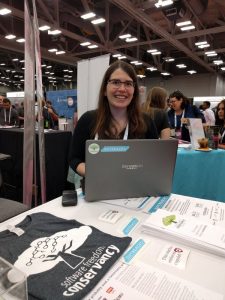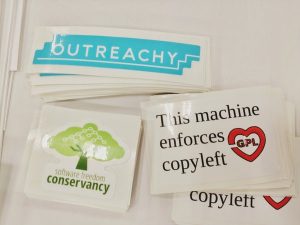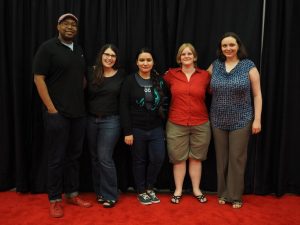![[RSS]](/static/img/feed-icon-14x14.2168a573d0d4.png) Conservancy Blog
Conservancy Blog
Displaying posts
tagged supporter
![]()
Reporting on OSCON 2016
by on May 28, 2016
Last week was OSCON 2016, and the first year that the conference was held in Austin, Texas. OSCON has always been an important conference for Conservancy and for me personally. In 2011, it was the first conference I ever keynoted (I was also on a keynote panel in 2008, which was the closest I'd gotten before then), and where I really started talking about my heart condition and medical devices. OSCON was also the conference where we had the first Conservancy booth and debuted Conservancy t-shirts and stickers.
Austin seems to really suit OSCON. The feel of the conference was comparable to Portland, but there seemed to be a lot of new local participation resulting in a much more diverse conference. I met a lot of great people for whom it was their first time at the conference and made a lot of good connections. Conferences, and OSCON in particular, are always short on time and often I was in a dead run from one thing to the next.
I participated in two sessions on Thursday. One was a talk I gave on employment agreements. I outlined basic issues to look for in signing an employment agreement but my main point was that employment agreements can often be negotiated. Companies have standard contracts that they use for all employees, but in many areas they may be prepared to edit the agreement as part of an onboarding negotiation. After you receive your offer, but before you sign the employment agreement, you are likely to have more power in the relationship than you will again. The company has expended resources in recruiting and interviewing you, and has come to the decision that you're the best person for the job. Just as you negotiate your salary and other important terms of employment, some of the contractual provisions are also likely to be flexible. I've seen a lot of agreements over the years, and every time I've talked to someone about this issue they've been able to get *some* change.
Because of this, and because it's so hard to know what to ask for if you're not a lawyer like me, Conservancy is working on a project of standard employment agreement provisions that could be worth asking for. If many prospective employees ask for this, some companies may start to give this as a perk to attract top talent.
The second session was a panel about free and open software foundations. Moderated by Deb Bryant, the panel discussed issues around foundation formation, fiscal sponsorship and revenue models. I was really excited that multiple people in the session recommended Conservancy as a nonprofit home, and also encouraged audience members to become Supporters of Conservancy! There are a lot of great organizations in free and open source software and it was so interesting to see how many roles the panelists serve in them.
Conservancy had a booth, so I spent most of the rest of the time there. It was great to be in one of the nonprofit areas with so many other awesome nonprofits in our field. It was also the first time we had multiple stickers, including the very first Outreachy stickers.


I was also able to catch a panel on patents that Bradley was a part of, eloquently reminding everyone how deeply problematic software patents are.
Lastly, it was great to meet with other Outreachy organizers! We don't have a chance to meet in person very often and we always have so much to discuss.

After the conference ended on Thursday, we had a chance to relax and talk about the conference with Conservancy Supporters at our pool party. I'm always struck by how impressive our Supporters are. While walking around the party, I caught conversations about the future of free software, copyleft, enforcement, patents, conferences and even one where we recruited someone great to apply for the GNOME Executive Director job! I was so excited by the enthusiasm of our Supporters. Aside from the financial aspect, which is critical for us, with such a small staff it would otherwise be impossible to do all of our work and tell people about it without their help. While it's taken me all week to recover from the conference and try to catch up on the backlog of work that piled up, I feel reinvigorated and recharged!
Bart Massey on Why You Should Be a Conservancy Supporter
by on January 28, 2016
In this video, Bart Massey talks about why he is a passionate supporter of Conservancy. Bart discusses why he thinks Conservancy is relevant for the next 20 years of software freedom, tells you about his favorite Conservancy project and strongly encourages you to become a Conservancy Supporter.
(Also available on YouTube.)
Key Charities That Advance Software Freedom Are Worthy of Your Urgent Support
by on January 25, 2016
I've had the pleasure and the privilege, for the last 20 years, to be either a volunteer or employee of the two most important organizations for the advance of software freedom and users' rights to copy, share, modify and redistribute software. In 1996, I began volunteering for the Free Software Foundation (FSF) and worked as its Executive Director from 2001–2005. I continued as a volunteer for the FSF since then, and now serve as a volunteer on FSF's Board of Directors. I was also one of the first volunteers for Software Freedom Conservancy when we founded it in 2006, and I was the primary person doing the work of the organization as a volunteer from 2006–2010. I've enjoyed having a day job as a Conservancy employee since 2011.
These two organizations have been the center of my life's work. Between them, I typically spend 50–80 hours every single week doing a mix of paid and volunteer work. Both my hobby and my career are advancing software freedom.
I choose to give my time and work to these organizations because they provide the infrastructure that make my work possible. The Free Software community has shown that the work of many individuals, who care deeply about a cause but cooperate together toward a common goal, has an impact greater than any individuals can ever have working separately. The same is often true for cooperating organizations: charities, like Conservancy and the FSF, that work together with each other amplify their impact beyond the expected.
Both Conservancy and the FSF pursue specific and differing approaches and methods to the advancement of software freedom. The FSF is an advocacy organization that raises awareness about key issues that impact the future of users' freedoms and rights, and finds volunteers and pays staff to advocate about these issues. Conservancy is a fiscal sponsor, which means one of our key activities is operational work, meeting the logistical and organizational needs of volunteers so they can focus on the production of great Free Software and Free Documentation. Meanwhile, both Conservancy and FSF dedicated themselves to sponsoring software projects: the FSF through the GNU project, and Conservancy through its member projects. And, most importantly, both charities stand up for the rights of users by enforcing and defending copyleft licenses such as the GNU GPL.
Conservancy and the FSF show in concrete terms that two charities can work together to increase their impact. Last year, our organizations collaborated on many projects, such as the proposed FCC rule changes for wireless devices, jointly handled a GPL enforcement action against Canonical, Ltd., published the principles of community-oriented GPL enforcement, and continued our collaboration on copyleft.org. We're already discussing lots of ways that the two organizations can work together in 2016!
I'm proud to give so much of my time and energy to both these excellent organizations. But, I also give my money as well: I was the first person in history to become an Associate Member of the FSF (back in November 2002), and have gladly paid my monthly dues since then. Today, I also signed up as an annual Supporter of Conservancy, because I'm want to ensure that Conservancy's meets its current pledge match — the next 215 Supporters who sign up before January 31st will double their donation via the match.
For just US$20 each month, you make sure the excellent work of both these organizations can continue. This is quite a deal: if you are employed, University-educated professional living in the industrialized world, US$20 is probably the same amount you'd easily spend on a meals at restaurants or other luxuries. Isn't it even a better luxury to know that these two organizations can have employ a years' worth of effort of standing up for your software freedom in 2016? You can make the real difference by making your charitable contribution to these two organizations today:
Please don't wait: both fundraising deadlines are just six days away!
I'm Running for the Linux Foundation Board of Directors
by on January 17, 2016
[This blog post received some press coverage. It's now unclear whether Linux community members can run for the Linux Foundation board. I will update here if I learn more. Steven J. Vaughan-Nichols' article has a good overview of the situation. ]
As we begin a new year, I'm super excited that Conservancy has almost reached our initial target of 750 Supporters (we're just 4 Supporters away from this goal! If you haven't signed up, you can push us past this first milestone!). We launched our Supporter program over a year ago and more recently, in November, we asked you all to become Supporters now so that Conservancy can survive. Conservancy is moving toward a funding model primarily from individuals rather than larger corporate sponsors. While we are about to reach our minimal target, we still have a long way to go to our final goal of 2,500 Supporters — which will allow us to continue all of Conservancy's critical programs, including copyleft enforcement. Many individuals have come forward to donate, and we hope that many more of you do so too! I was really excited about the statement of support published last week by the GNOME Foundation, and in particular their point that enforcement is necessary and benefits GNOME and free software as a whole.
Of course, we're still excited about our for-profit sponsors, and list them at the top of our sponsors page. We'd like to draw particular attention to Private Internet Access, which gave a generous match so that individuals who join this month will double their donations via the match. We have only two weeks left to take advantage of this, so if you are considering donating, please do it soon!
Conservancy is focusing on individual giving via our Supporter campaign because our organization has a very special and unique status, called 501(c)(3) charity status here in the US. That means that Conservancy's constituency is the general public. We do the jobs in the software freedom community that maximize the rights of the general public in the use and development of their software.
We're glad that so many support us in doing those jobs for public good. But Conservancy doesn't imagine that we can do all the jobs in our community. In fact, there's a definite need for companies to have an organization that specifically represents their interests in the software freedom community. In my view, the organization that does the job best is the Linux Foundation. Linux Foundation is a 501(c)(6) trade association, so they advocate ultimately for the common business interest of their members. I've been impressed at Linux Foundation's growth and their increasing ability to market Linux and related free software technologies to new companies; no organization does more to encourage companies to adopt Linux than Linux Foundation.
While trade associations like Linux Foundation usually represent only companies, Linux Foundation seeks to do even more. I've talked a lot, including just a few days ago, with Linux Foundation Executive Director Jim Zemlin. He often points out how, while there is no public-good mandate for trade associations, nothing stops trade associations from doing work in the public good, since that often does align with the needs of their corporate members. In particular, Linux Foundation did something great to deliver on that idea — unlike most other trade associations, Linux Foundation by laws allow for two Board Seats elected by individuals.1 This gives individuals a minority voice on their Board of Directors, so that companies that control Linux Foundation's board has a direct path to hear for the community.
I signed up last year as an Individual Affiliate of Linux Foundation and nominated myself as a candidate for Linux Foundation's Board of Directors. At my Linaro Connect keynote in late September, I publicly announced my candidacy for the 2016 Linux Foundation Board of Directors. If elected, I look forward to the opportunity to give feedback and help directly with Jim's commitment to help Linux Foundation do good things not just for its corporate members, but for all individuals, too. While Linux Foundation has not yet announced when this years' elections will occur, I hope all Individual LF Affiliates will watch for the election and vote for me. I'll of course update the community here on when I know more about the details.
While the focus of my work is at Conservancy, I really believe that all of us should give time to other organizations in the community to make all of them better. Conservancy announced in the last two years multiple collaborations (such as our GPL enforcement principles and copyleft.org) with the Free Software Foundation, and I have long provided pro-bono legal counsel to both the FSF, GNOME Foundation and Question Copyright, in addition to my job at Conservancy. I also try to contribute whenever I can to the GNOME engagement team. While I do believe prioritizing volunteer work for charities is ideal, I also see an opportunity here, as I said in my Linaro keynote, to help companies understand the needs and mindset of community and non-commercial developers who also collaborate on key software freedom projects. I hope that platform will find resonance with Linux Foundation's Individual Affiliates, and I ask for their votes.
1 This link on Linux Foundation's website broke a few days after I posted this blog post. The link in the main post is to the Google Cached version for now.
